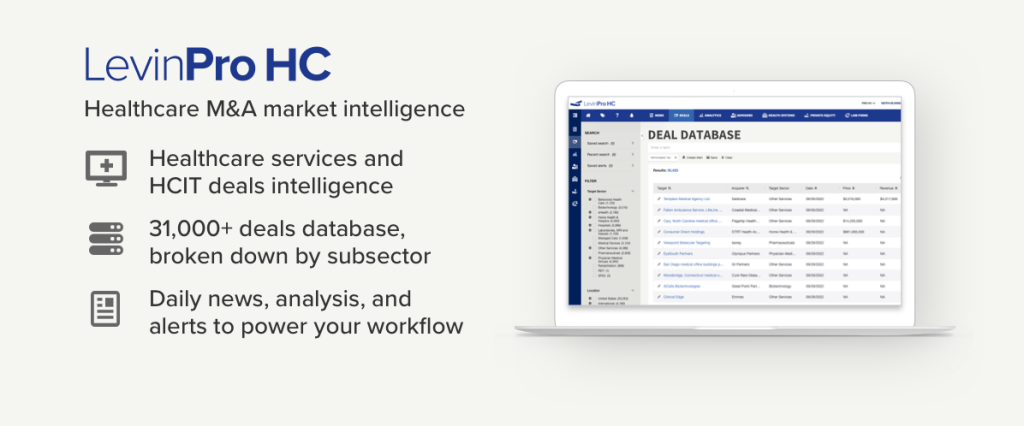
Levin Associates sat with Dana Jacoby, the CEO and founder of Vector Medical Group, and Gary Herschman, a partner at Epstein Becker & Green, P.C., at the 6th annual Physician Transactions Conference in Las Vegas in March 2023 to discuss what’s driving physician practice M&A. Their separate interviews have been combined into one Q&A, which has been lightly edited for clarity and brevity.
What is the future of private equity and other outside investment in healthcare?
Jacoby: I’m very bullish on the future of healthcare and I’m very excited about it. There’s just this crescendo of change coming into healthcare. I think having all these disruptors coming in is actually very healthy for our healthcare system, and it’s not just private equity driving it.
It’s companies like Amazon and CVS and Walgreens. It’s the shift to outpatient settings, wearable technologies, and telehealth. It’s scaring some people that were used to the status quo, but I think healthcare was ready to be disrupted.
When you talk to physicians who are considering partnering with private equity in physician practice M&A deals, what is their reasoning?
Herschman: They see a lot of advantages with private equity. Major players in healthcare like Optum, MedExpress, Aetna, Village MD, and Walmart are all getting bigger, and hospitals are growing and acquiring doctors. Independent physicians find themselves with all these huge growing empires around them, and they need to be bigger and have more resources to compete.
Jacoby: The ability to invest in infrastructure is part of the consideration. Doctors are looking at the pace that healthcare is changing and the investment opportunity. You have to get bigger in order to create economies of scale either way, so the question becomes: Do you dip into your own pocket and dig deep to do it, or do you use somebody else’s money in order to create that runway?
It’s also about the level of sophistication that is needed now to stay ahead of the curve. Doctors are thinking about, “I need to hire a sophisticated C-suite of executives. I need a data analytics team for value-based care or risk-based initiatives. I have to do revenue cycle management.” Running a medical practice nowadays requires a lot more strategy.
Many industry experts have told me that private equity investors tend to stay out of healthcare decisions. Has that been your experience?
Jacoby: Yes, this is still very much a doctor-driven medical model in every category. What a private equity group wants to do is buy a really good platform group of physicians and then see if they can scale the business. It’s not, “You saw 32 patients. Can you see 37?” It’s more, “Have we built an ambulatory surgery center in your backyard? Is there an opportunity to infuse new patients or add new patient care models?”
When you do a private equity transaction, the board will be made up of a handful of the physicians from the group and a handful of the private equity folks. It’s this collaborative approach to care. The financial folks know not to go into the operating room, and the medical staffers aren’t creating their own Excel spreadsheets. If you choose a good private equity partner, you should feel like they’re the wind at your back, not somebody that’s oppressive to your ability to grow the business.
Herschman: There are common issues doctors always ask about: “Am I going to lose clinical control? Will the investor make us work harder or change our schedule? Will I have less vacation time or will my benefits be reduced?” The answer to these questions is “no,” and these details are all included in the final contract.
After closing a deal with private equity, what does change is now the practice has a corporate infrastructure of seasoned executives that handle the business end, including investing capital in new offices, new ambulatory surgery centers, and new expensive equipment like imaging.
If the practice is sold again in a physician practice M&A deal, do the physicians have to renegotiate with the new buyer to keep their autonomy?
Herschman: No, nothing is going to change when they sell again. The new investor usually takes the existing agreements and they would need consent from the physicians to change anything.
Plus, if you’re an investor and you’re buying this big consolidated group that could be worth $100 million, where the physicians are happy and the system is working well, you’re not going to try to change things. You don’t pay that much money and then go change everything.
What do you think is important for physician groups to keep in mind when exploring outside physician practice M&A?
Jacoby: I want to make sure doctors are educated about how to choose the right partner. They need to ask the right questions to potential private equity partners, like how much experience the firm has in the physician practice management space. Especially during COVID, there was a unique level of interest in healthcare from private equity companies and some of them didn’t have any experience in healthcare.
Herschman: We get a lot of questions from younger physicians saying, “Is this deal just about the older doctors cashing out before they retire?” And the answer is no. Younger doctors who are going to be there for another 20 years stand to gain from multiple bites in the future because they get to monetize the real value of their practice. Those subsequent liquidity events can be extremely lucrative.
Are there risks to patients when we’re talking about private investment in healthcare? When the average person imagines hedge funds and private equity, they may be concerned that those groups care only about the bottom line.
Jacoby: Sure, they probably imagine sharp-elbowed Wall Street people. But I don’t know that the patient even notices when private equity is involved. The longer-held private equity-backed specialties are ophthalmology, dermatology, and dentistry, and most patients wouldn’t know if their local dermatologist was part of a private equity-backed platform.
Private equities are not coming in to practice clinical medicine. I think that would be concerning for all of us if Wall Street were coming into the operating rooms but that’s not what they are meant to do.
Herschman: Quality is number one for any healthcare provider. If you’re building a platform, if you’re one of these big companies or a private equity consolidator or a growing hospital system, quality is the most important thing. Nobody wants bad reviews or negative quality scores.
If anything, there is more investment in value-based care, advanced electronic medical record systems, and data analytics. It’s so important in value-based care to collect and analyze data to be able to treat patients more efficiently.
So private equity has the money to help medical groups grow and they don’t want to influence medical care. What’s the catch?
Jacoby: I really don’t have any concern about clinical care changing because I just haven’t seen that with my private equity-backed clinicians. If anything, they’ve been able to move faster and be more innovative.
Herschman: There is no catch. I mean, physicians are usually giving up administrative control of the practice. And some doctors, especially doctors who’ve been practicing for 30 years, don’t necessarily like that because they always ran their practices themselves. But, especially for a lot of younger doctors, they don’t want that business involvement. They just want to practice medicine.
Erin Laviola is a writer for Levin Associates.
Levin Associates provides comprehensive coverage of the deals, companies, and trends shaping the healthcare industry. Clients access proprietary M&A transaction data and daily news/analysis through the LevinPro platform. Schedule a demo today to see what LevinPro can do for your team.


